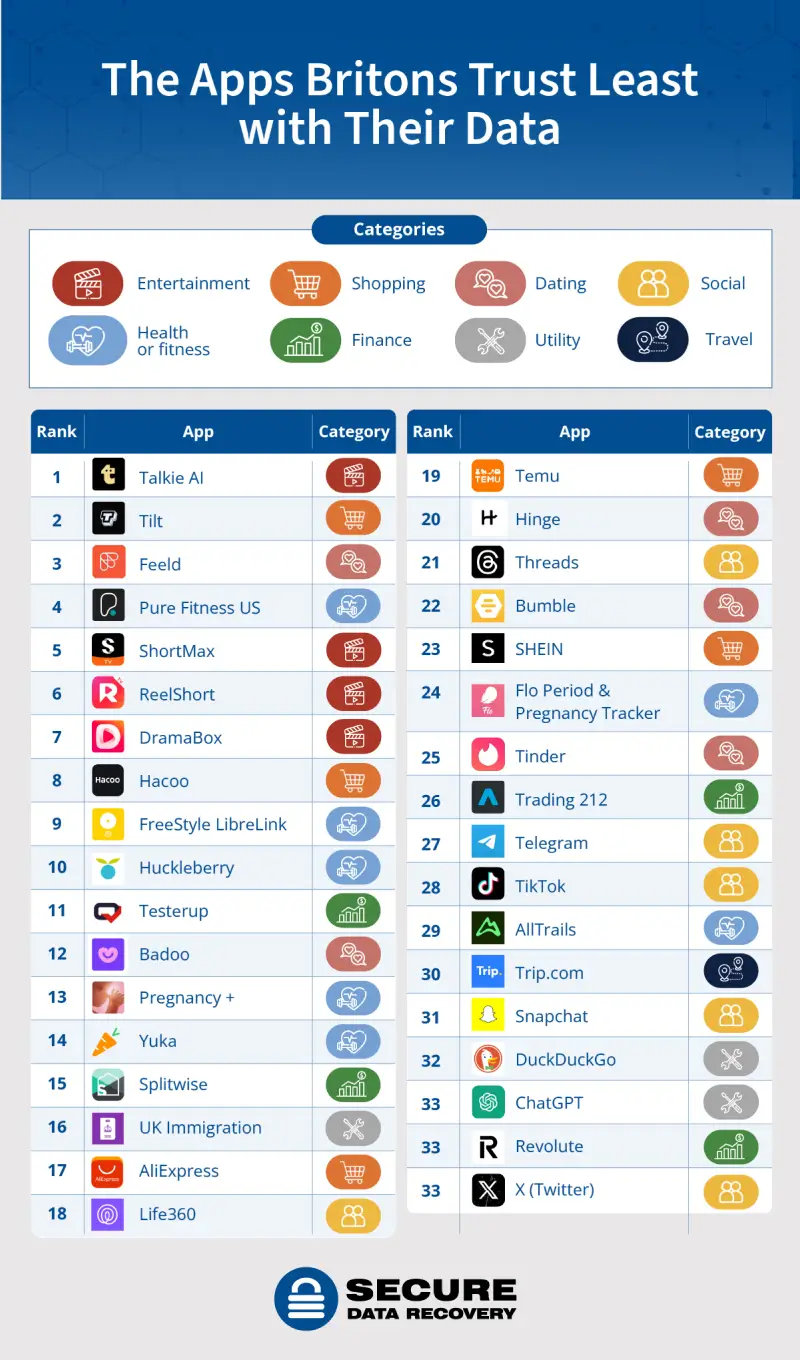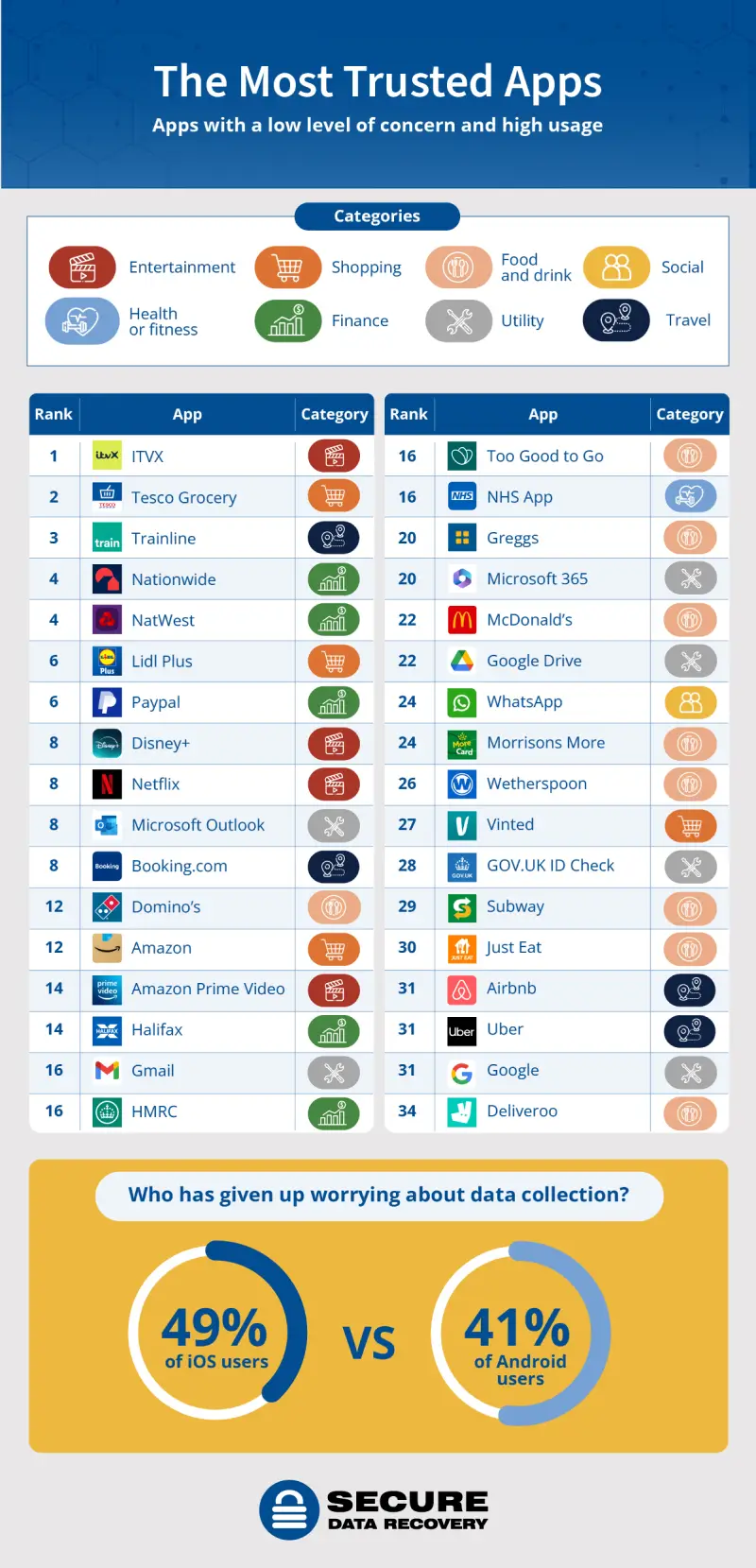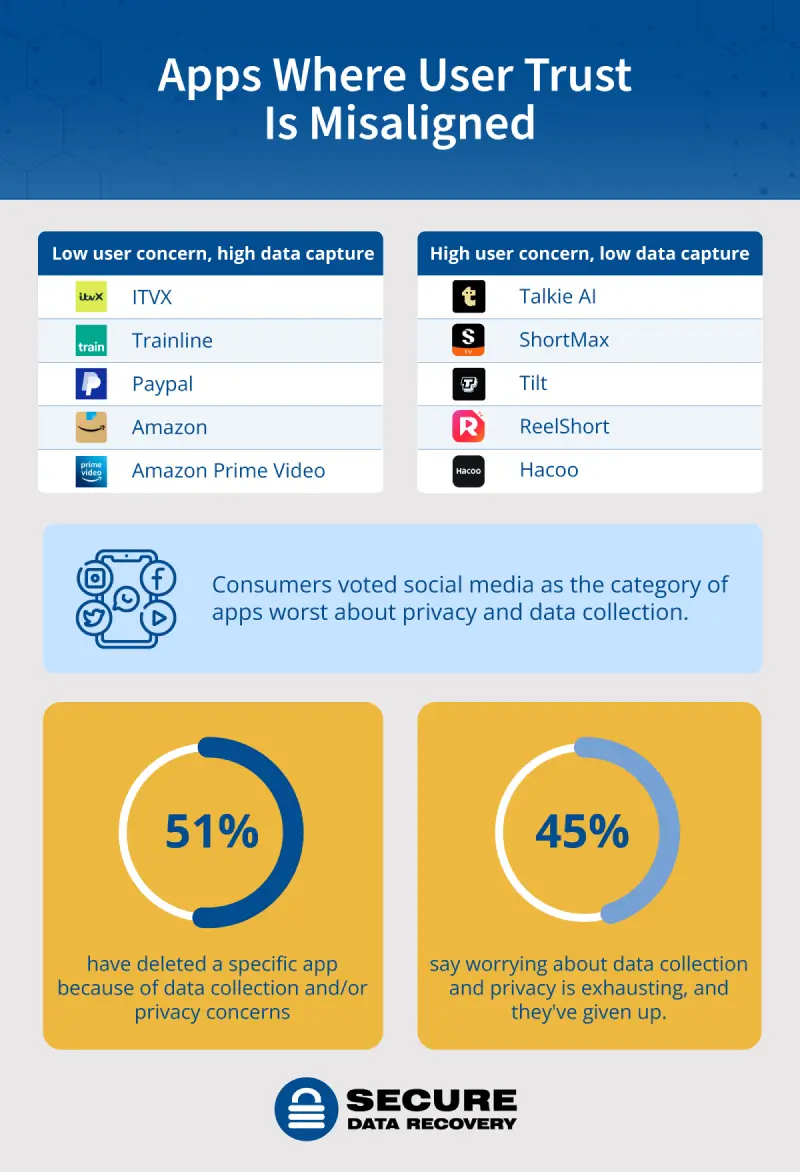Have you ever been creeped out by oddly specific targeted ads you see while scrolling through your phone? Have you ever been bothered enough to go down a rabbit hole trying to uncover the dodgy app on your phone that’s harvesting all your personal information to direct those ads? If you’re like half of the UK, then probably not.
Downloading an app takes two seconds; identifying the app or apps most egregious about tracking you is more complex. Luckily, the Secure Data Recovery team has done the legwork for you. We found the most popular apps in the UK, gathered every scrap of information they use to track you, and surveyed 1,001 UK residents about how much they trust these apps. We combined the data in an analysis to find out how well Briton’s trust aligns with data collection practices.
Key Takeaways
The Apps Britons Are Most Concerned About
Topping the list of the least trusted apps are dating apps, with Feeld, Badoo, and Hinge leading the way. No dating app escaped concern, however, as 100% of the dating apps we polled Britons about returned very high data privacy concern levels from respondents. Interestingly, more Britons were concerned with dating apps than the number who reported using them.
In fact, many of the apps that Britons are most concerned with had far higher reports of concern than use. This pattern suggests a possibility that concern levels are so high that Britons opt out of using certain apps altogether.
The same story applies to health and fitness apps, where Britons report very high data privacy concerns. Respondents had very high concerns regarding 7 of the 10 health and fitness apps we polled them about. Pure Fitness US, FreeStyle LibreLink, and Huckleberry were the top three health and fitness apps users were most concerned with.
Shopping is the third least trusted category of apps, according to our results. Britons have very high levels of data privacy concerns for half of the 10 shopping apps we queried Britons about. Tilt, which is the #2 least trusted app overall, topped the charts for the shopping category. Right behind, Hacoo and AliExpress take #2 and #3, beating out Temu, which is widely known for data privacy concerns.
The following apps from each category are the ones that Britons have the highest concern about:
The Apps Britons Are Least Concerned About
While some apps raise alarms for Britons, others have relatively low levels of data privacy concerns. Of all 10 food and drink apps we polled about, none returned very high concerns from respondents. While no food and drink apps made the top 10 list of most trusted apps, all of them had low concern levels, except Uber Eats, which had an average concern level from respondents. The most trusted food and drink apps are Domino’s, Too Good to Go, and Greggs.
Although entertainment apps were right in the middle of the pack for the most trusted apps, the entertainment app ITVX panned out as the #1 most trusted app overall. ITVX had the lowest concern level among users regarding the data it tracks.
Similarly, 50% of the shopping apps we polled about returned very high concern levels from respondents, but the #2 most trusted app overall is a shopping app, Tesco Grocery. The #3 most trusted app is Trainline, a travel app. Travel apps are categorically the #3 most trusted overall as well.
Apps Britons Should Be More Concerned About
Just because an app has a high level of trust doesn’t mean that trust is valid. After all, you may not realize apps list data collection details in the privacy section of the app store, and even if you did, those details can be quite confusing. In fact, 49% of iOS users and 41% of Android users say they’ve “given up” worrying about data collection altogether.
However, an app collecting your data doesn’t necessarily make an app untrustworthy. Some data collection can enhance the user experience. Users experience the benefits of data collection when provided with personalized promotions based on their app usage. Trust begins to erode when companies sell or share the collected data with third parties for reasons unrelated to improving the in-app experience.
While it’s not a perfect measure, the more data segments an app collects, the higher the likelihood that your data is being used in ways you may not like. Our analysis scrutinizing the data collection policies of the most popular apps Britons use, combined with our concern survey, reveals the blindspots users have about certain applications. The top five apps that had low data privacy concerns but disproportionately high data capture were:
ITVX and Trainline are the #1 and #3 most trusted apps, respectively. However, both of these applications have high data capture levels. ITVX collects 39 segments of personal data, and Trainline collects 44. Only one app had very high data capture rates, as defined by capturing over 50 segments of personal data — Amazon, which collects 51.
Conversely, Britons have high levels of concern for apps that collect relatively far fewer segments of data. Whether based on assumptions due to the type of apps or something else, users' concerns are misaligned the most for the following five apps:
Talkie AI, the least trusted app in our entire survey, is actually one of the most trustworthy. Out of the 108 specific personal data segments an app has the option to collect, Talkie AI only collects 1 segment. Tilt, the #2 least trusted app, only collects 5 data segments. For reference, the apps in our survey average a collection of 25 personal data segments apiece.
Categorically speaking, users could be more concerned about food and drink, travel, and social apps. The apps in these three categories had much lower concerns from respondents than they ought to. On the other hand, entertainment, shopping, and health and fitness apps could be scrutinized less, as user concerns were often much higher than warranted.
How Britons Feel About Data Collection Gathered by Apps
As we use more apps and the amount of personal information available to collect only increases, the issue of data collection can feel both alarming and fruitless to worry about. In fact, 45% of our respondents said that worrying about data collection and privacy is exhausting, and they’ve given up entirely.
It can take a lot of time and research to figure out how invasive a specific app is, which is why users need more studies like these to help them figure out which apps they can trust. After all, even though 51% of respondents say they’ve deleted a specific app because of data collection or privacy concerns, our results show that these concerns can sometimes be misplaced.
For example, respondents voted for social media apps as the category that is worst about privacy and data collection. Meanwhile, our results show that while social apps do have very high data capture levels, users should be more concerned about entertainment, shopping, health and fitness, dating, utility, and finance apps, as their concerns are lower than warranted.
Yet one pragmatic sentiment that emerged from the study is that a full 53% of Britons would be more open to data collection if companies paid them for it. While this outlook shows a willingness to exchange data for value, it is an uphill battle in the current state of the market. Many apps are free to use with the caveat that you, the user, are the product.
Protect Your Data with Confidence
It can be easy to assume which apps are tracking you the most or least, but as our study shows, these assumptions can be rooted in a false sense of security. Some of the most data-hungry apps are the most trusted by Britons, while some apps that, on the surface, seem like they would collect a lot of data actually have a more hands-off approach.
Don’t take your data security lightly. Monitoring it can feel exhausting and make you want to give up, but the good news is that you have help. While the Secure Data Recovery team works hard to keep you informed on data privacy and collection, we also have your back in the event of a worst-case scenario — total data loss.
If your phone breaks and you need iOS data recovery or Android data recovery, before you bin it thinking all your precious local data is lost forever, contact us to speak with our data recovery specialists. We have a 96% recovery success rate and welcome every data recovery challenge. Our substantial presence in the UK means you have access to the most trusted data recovery company in the world.
Methodology
On September 16, 2024, we surveyed 1,001 people across the UK on the Prolific online research platform, asking about the apps they trust most and least. We combined the survey responses with a separate analysis we did on September 17, 2024, in which we looked at a comprehensive list of apps in different categories and checked what kind of data they collect from users by looking at the Privacy Details section of each on the Apple App Store.
The categories we looked at were contact info, health and fitness, financial info, location, sensitive info, contacts, user content, browsing history, search history, identifiers, purchases, usage data, diagnostics, and other data. After the data had revealed which categories of apps collect the most segments of data from their users, we compared that to the survey responses to see how the apps UK residents trust least with their data are aligned with those that collect the most data from the user.
Of our respondents, 48% identified as female, 51% as male, and 1% as non-binary. Respondents' ages ranged from 18 to 77 years old; 14% were Gen Z, 28% were millennials, 32% were Gen X, and 26% were baby boomers.













